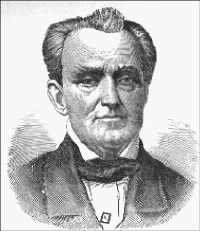|
Colonel John Johnston
John Johnston was born March 25, 1775, near Balleyshannon
in Northern Ireland. His father was of Scottish origin and his mother French Huguenot.
Three brothers, including John’s father, and all their families emigrated to
Sherman’s Valley, Pennsylvania, in 1786.
It was now 1802, and Colonel John
Johnston, along with his new bride, road their horses from Philadelphia to Fort Wayne to organize the U.S. Indian agency in the area. He was
one of the most successful Indian agents in U.S. history, forming lasting friendships with
the Indians and the people he employed. In an 1805 letter to Henry Dearborn, secretary of
war, he talks about his trusted interpreter, John Flinn. This is the same John Flinn who
was with Col. Hardin in Shelby County when Hardin was
murdered by Indians.
Land records show that Col. Johnston, while still the Indian agent at Fort Wayne,
bought a quarter section of land near the Indian village of upper Piqua, Ohio, on June 6,
1803. When the Indian agency at upper Piqua was established in 1811, Col. Johnston asked
to be transferred to the new agency. The government acquiesced to his request, and the
Johnston Farm Indian Agency became a reality. Johnston was very popular with the
Indians and they sought his advice on a multitude of issues on a regular basis. Both the Miami and Shawnee tribes respected
and admired him. He was well known to the Miami and other tribes that visited his agency
near Fort Wayne during his nine year tenure.
Col. Johnston, in his records writes very highly of the Shawnee and Miami Indians,
citing an incident in 1812 when the British and their Indian allies attacked Fort Wayne,
killing several people, including his brother Stephen. During the battle, Stephen had
tried to escape through the enemy lines, carrying dispatches to General Harrison’s
headquarters at St. Mary’s, and to, hopefully, return to his wife in Piqua. Johnston,
now located in upper Piqua, asked for help from Chief Capt.
Logan of the Shawnee to move the women and children from the fort to safety in Ohio.
Within hours, the chief had organized a large group of volunteer Indians who left
immediately for Fort Wayne with a message from Col. Johnston. They returned safety, with
their charges, to Piqua. Col. Johnston writes, "The ladies spoke (of the Indians and
their escape from Fort Wayne to Piqua) in the highest terms of kindness, humanity and
delicacy and care of their Indian escort. This gallant and ever to be lamented Chief in
the subsequent year fell a sacrifice to his high sense of honor in an unequal fight with
the son of Elliot the British agent and a party of Indians headed by the noted Putaw chief
Winnemac in advance of Fort Defiance."
Johnston also paid the chief $20 to bring his brother Stephen’s body back to Piqua
for burial in the Johnston cemetery located on the property grounds. He was probably the
first person buried in the new cemetery. His home and grounds, as they stand today at the
Piqua Historical Johnston Farm site, were built between 1812 and 1814. He also noted that
the Miami Indians frequently ate the human flesh of prisoners captured during warfare
after burning them at the stake. The Shawnee and Delaware also executed captives by
burning them, however, they did not eat their unfortunate victims.

Colonel John Johnston
'Indian' segment written in December, 1997 by David Lodge
[ Back to Indians Index ]
|

